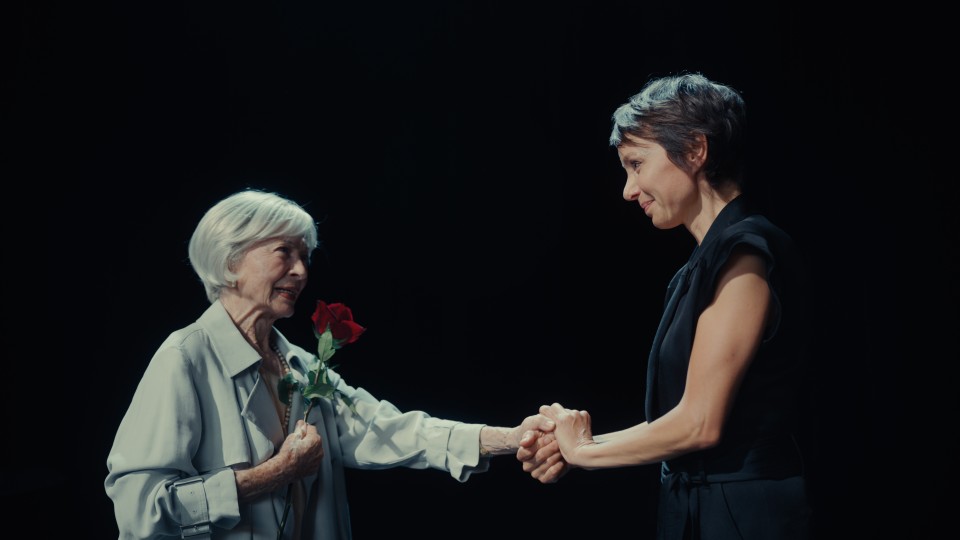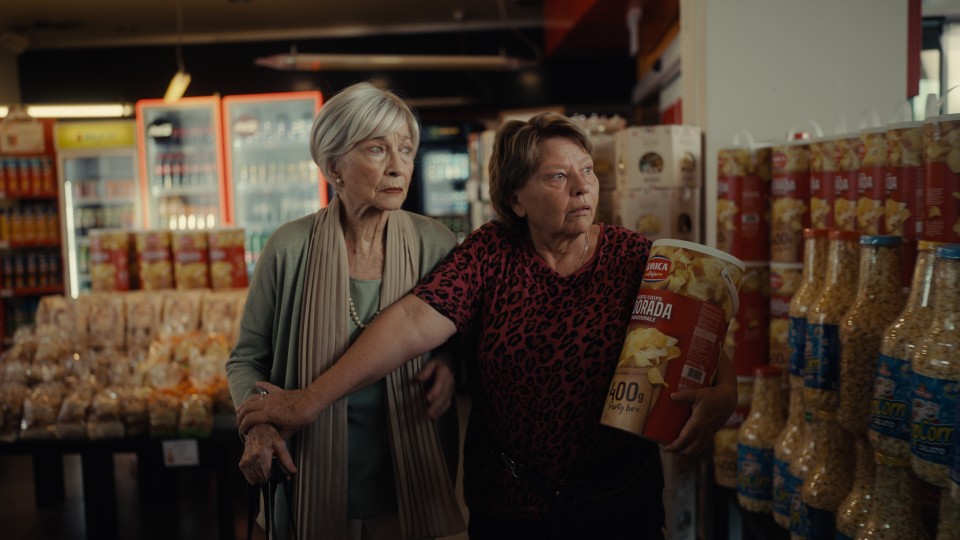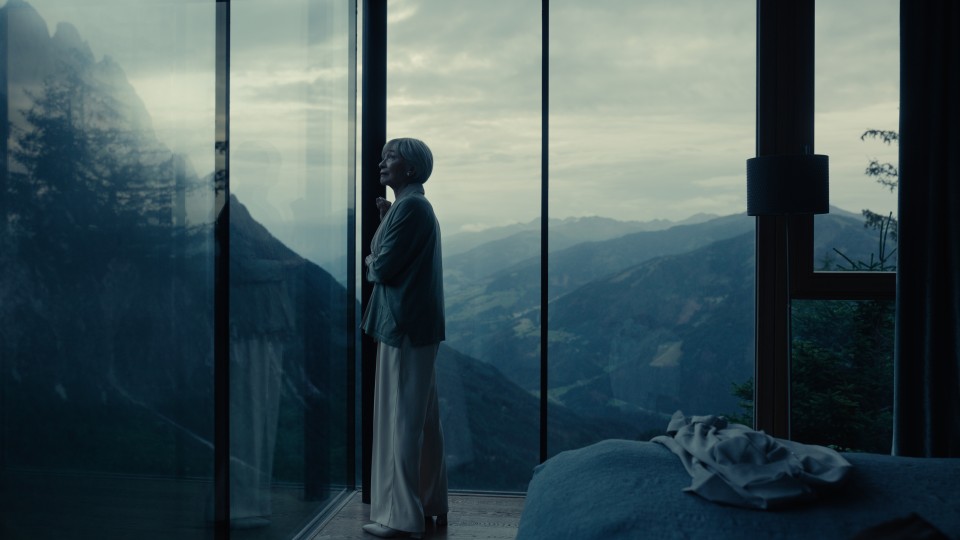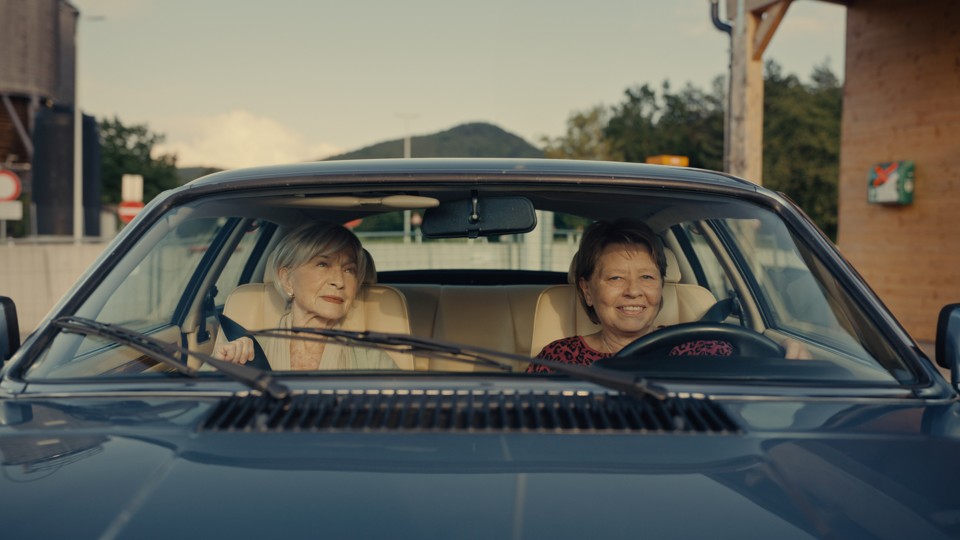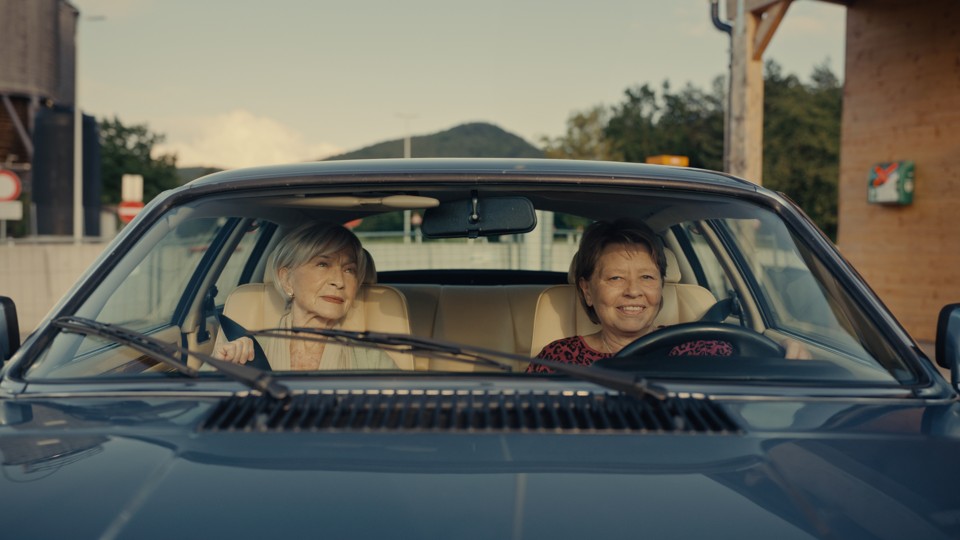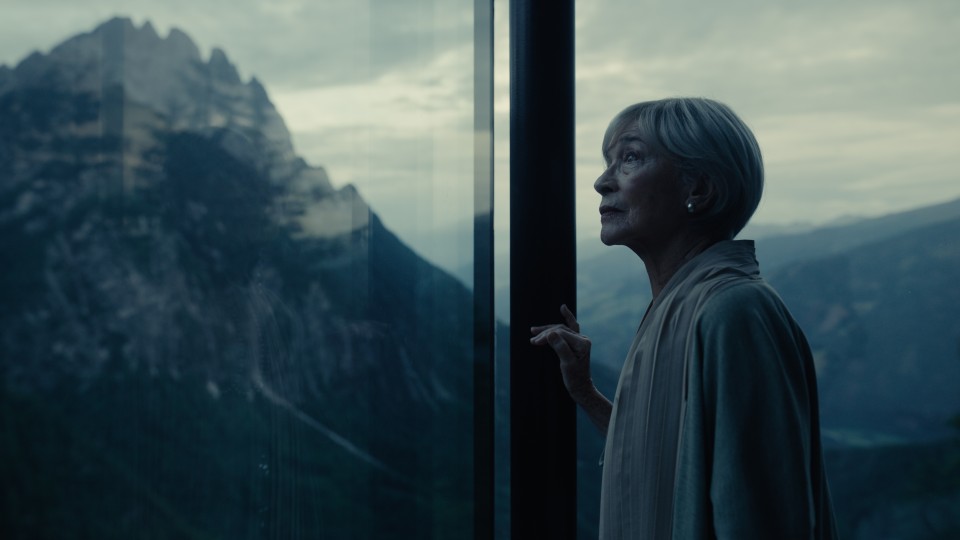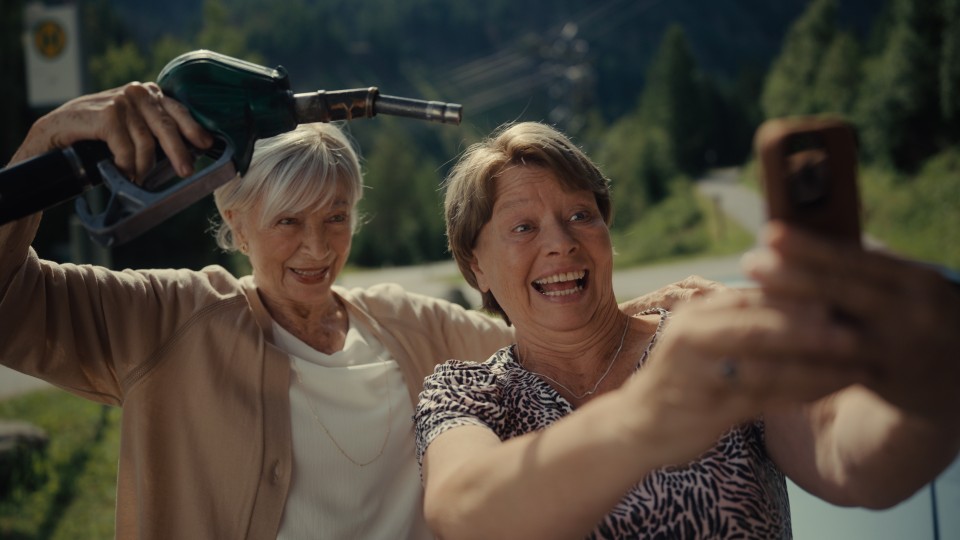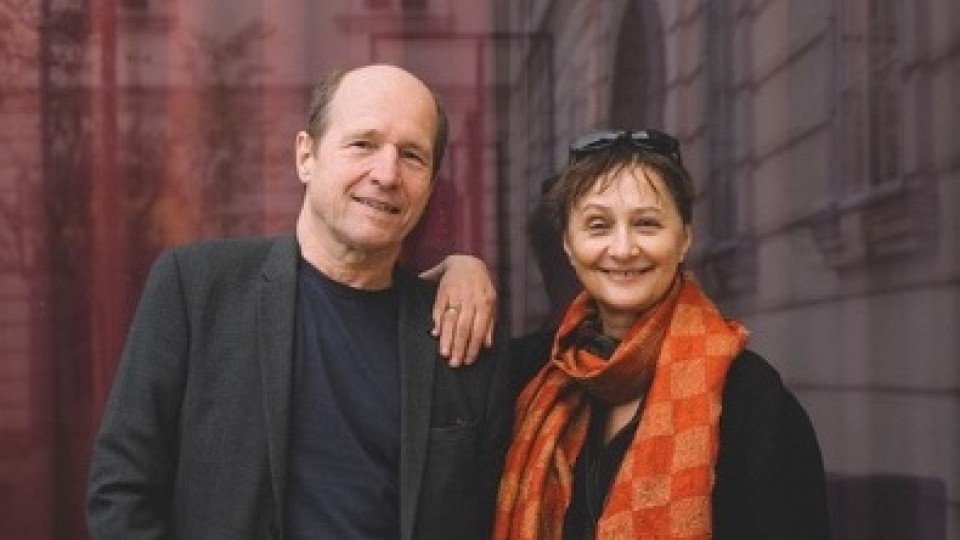Two women have had enough: of being alone and of paternalism. Toni’s life has always been tough, and although Helene enjoyed
fame and fortune as an actress, she’s now over 80 and finds the loneliness so hard to bear that she’s decided to put an end
to it all in Switzerland, with assistance. But how will she make it to her appointment on time when some people want to prevent
her with every means at their disposal? In their comedy 80 PLUS, Sabine Hiebler and Gerhard Ertl dispatch two opposing temperaments on a road trip that’s about life and death – but even
more about defying one-dimensional concepts of aging.
Coming of Age, your first film on the subject of age and independence, met with a resounding response from audiences in 2011. What motivated
you to address this topic again?
SABINE HIEBLER: There’s still plenty of room for improvement with all these issues, in socio-political terms; a lot more has to be done so
this phase of life can accommodate the individual. Not only institutionally but also in our minds. After all, the biggest
limitations are always in our heads. We were very keen to send two such dissimilar people on a journey. 80 PLUS is mainly
about a late female friendship.
GERHARD ERTL: Two focal points of our current film work come together here. On the one hand, we’d wanted to make a road movie for a long
time, and despite increasing social and media visibility, the subject of old age hadn’t been fully told on film. So we came
up with the idea of a kind of Thelma and Louise story in old age.
What fundamental changes have your current research revealed in relation to old age and euthanasia?
SABINE HIEBLER: Although the legal framework for euthanasia has changed in Austria in the meantime, the practice is a long way behind. There
is still a long way to go before the situation is anywhere like as advanced as in Switzerland or the Netherlands.
GERHARD ERTL: When the Austrian Constitutional Court revoked the ban on assisted suicide, it brought the controversy surrounding this subject
more out into the open, to a large extent shifting it out of the taboo zone. It has also become apparent that there’s already
broad approval for euthanasia among the general population. And the more intense political pressure has prompted significant
progress regarding the subject of old age: it’s becoming more "normal" to be old and to see, treat and experience old age
as a phase of life like any other.
Was it your aim from the start to anchor the film in the genre of comedy? Perhaps precisely because it is about the topic
of saying farewell to life?
SABINE HIEBLER: Yes, the plan from the beginning was to make a film that was as full of energy as possible about having to die and life up
to that point.
GERHARD ERTL: Together, our two protagonists succeed in finding their way back to the course of their lives after having lost their bearings
or been forced to change direction. As soon as we began working on this project it became clear to us that this developing
late friendship between our two heroines would be humorous. A buddy movie with two quite different women who provide each
other with unexpected perspectives on their lives.
Two women decide to get into a car and not let anyone tell them what to do. What possibilities does the genre of the road
movie offer?
GERHARD ERTL: This genre always revolves around the theme of freedom and independent action, in terms of possibility and impossibility.
In our case, it proves possible for the two women to liberate themselves from the constraints and burdens restricting them
right up to the start of their journey, so they become freer.
SABINE HIEBLER: And our two heroines have a lot to fight for in that sense, with so many barriers to overcome – both internal and external.
How did these two personalities emerge in the scriptwriting process?
GERHARD ERTL: We knew from the outset that we wanted Christine Ostermayer for the role of Helene. She was also involved right through the
development process, recounting some of her own experiences in discussion with us.
SABINE HIEBLER: And then as we worked on the script, we sensed that it was crucial to have an equally individual but completely different
second character, in order to create as much tension as possible. Margarethe Tiesel was the ideal person for that role, which
we then tailored to her.
The successful actress who sacrificed the chance for children of her own, the woman with only rudimentary education who became
pregnant at an early age and had to struggle to get by as a single parent after a brief marriage. Women's lives on the surface
and behind the scenes. What points were you making with that contrast?
GERHARD ERTL: Our buddy movie also lives from what is essentially the distinguishing feature of this genre: two very different characters
who challenge each other in order to come up with solutions. The task for us was to generate, from this contrast between the
protagonists, the wit and energy we wanted to underpin this narrative. As the story advances, the contrast between the lifestyles
of our heroines gives way to understanding and acceptance of the other, of the unknown: a quite extraordinary friendship develops,
which bridges the class and educational differences.
SABINE HIEBLER: We wanted two individual attitudes to life, with very different starting situations, mentalities and strategies for dealing
with difficulties. Each woman has her strengths and weaknesses, and it's the combination that’s crucial. Helene actually has
everything, but she’s tired of life. Loneliness and depression in old age are part of that – and along comes Toni, who still
wants to relish every drop of life.
GERHARD ERTL: Helene's confrontation with Toni becomes cathartic for her. With the help of Toni's very direct hunger for life, she succeeds
in breaking open the rigid shell she has constructed around herself and entering life afresh, so to speak.
Writing dialogue for a comedy about death must have a very particular appeal. It's also a balancing act. How would you describe
the scriptwriting experience?
SABINE HIEBLER: We Austrians actually have a very dark sense of humour; it’s said that Death himself is Viennese. For me, it just makes sense
to joke about serious topics. Joking makes difficult things easier; you can simply approach everything better with humour.
The balancing act involved is always an issue; I think the limits are different for everyone.
GERHARD ERTL: Being able to deal with death in a humorous way has a liberating attraction. And applying that humorous approach in your
own life is also appealing.
A cameo appearance by Stefanie Sargnagel refers to another of your films, namely Sargnagel. There’s an interesting quote from
her: Aging with dignity is a stupid cliché. You should impose your fear of death on the whole society, at the top of your voice. What do you think of her words?
SABINE HIEBLER: The question is the definition of "aging with dignity". Being as little a burden as possible to other people only helps them
in practice, after all. And it leads to old people withdrawing – and more or less disappearing from society – as soon as they
are restricted in any way. Even if it’s just not being fast enough to get over a crossing on the green light anymore.
GERHARD ERTL: Steffi appears halfway through the film as the shaman character, a familiar figure in the genre, who gives our travellers
food for thought on their journey. Her words have a typical Sargnagel aggression, of course. She’s demanding that the older
generation should have a provocative presence and self-confidence. A social concern that we share with her, and not just in
the film.
SABINE HIEBLER: Yes, Steffi's line is about the self-empowerment of women and old people, about not modestly taking a back seat in order
to make room for others who are younger and stronger.
What memories do you have of the filming itself, working together with the two actresses and shooting a road movie with a
beautiful classic car?
SABINE HIEBLER: OMG! The beautiful classic car: to tell you the truth, it was touch and go whether it would actually make it to the end of
the film. The car was a basket case, and incredibly uncomfortable on top of that! We hadn't anticipated the difficulty of
just getting in and out of the car, and it was insanely hot inside. Christine and Margarethe coped with it fantastically;
that was really impressive. And the chemistry between the two of them was just great.
GERHARD ERTL: It’s hard for me to imagine a better combination for an odd couple in a buddy movie. Those two brought very different qualities
to the game, and then they developed a whole new thing together, a synergy which was exactly what we needed for this project.
Helene has a special relationship with the young actress Thea, who plays a role in Zurich which Helene herself had great success
with as a young woman: Clarice in Simone Beauvoir's only play, The Useless Mouths. How did you come up with that work?
GERHARD ERTL: We stumbled across it during our research, and it was immediately clear that it had to be in the film. The Useless Mouths
deals with a fundamental issue in our project from the opposite perspective, as it were.
SABINE HIEBLER: We rediscovered this piece for our film – it had virtually been lost. It’s the story of the men in a besieged city who decide
to hand over their old people, the sick, the children and the women – the "useless mouths" – to the enemy in order to ensure
their own survival. It discusses questions about who has the right to decide on the life and death of other people, weaker
people. Questions that we also examine in our film, albeit in a different form and with different means.
In the end, there is a fusion of fiction and genuine praise for Christine Ostermayer. The scene with the tribute in the movie
theatre pays cinematic homage to important roles in her career. How did the selection of these scenes come about?
GERHARD ERTL: We wanted a historical cross-section of Christine's stage and film work for this film sequence – and we were amazed how little
material was available in the archives.
SABINE HIEBLER: There was hardly anything from her younger years, in particular. But it still ended up as a beautiful arc from the very young
Christine Ostermayer to her late work. Helene also addresses the point in our film that as an aging actress you are predominantly
reduced to playing "the old and dying, the old and demented, the old and sick". We tried to use these scenes sparingly.
GERHARD ERTL: Although our approach to dying in the film is really focussed on the life before.
Interview: Karin Schiefer
September 2024
Translation: Charles Osborne

